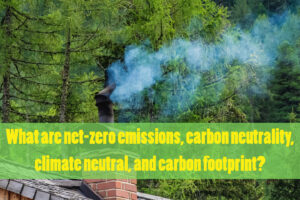On November 13, 2021, a new global agreement – the Glasgow Climate Pact – was reached at the 26th Conference of the Parties (COP26) to the United Nations Framework Convention on Climate Change. The conference was held in Glasgow, Scotland, United Kingdom, from October 31 to November 13, 2021.
The COP26 summit, with a delay due to COVID-19, is particularly important because it is the first meeting, since the 2015 Paris Agreement, for countries to provide updated national pledges to mitigate climate change. Under the 2015 Paris Agreement, countries are expected to report their progress and new climate plans every five years.
The Glasgow Climate Pact is an outcome document of the COP26 summit. It is agreed by all 197 countries meeting in Glasgow. Its main elements include:
- The first ever inclusion of a commitment to limit (“phase down”) the use of coal.
- An agreement to phase out subsidies that artificially lower the price of fossil fuels, but with no firm dates.
- World leaders promise to stop deforestation by 2030.
- A commitment to increase financial support for developing countries (to help them adapt to climate impacts).
- An agreement to re-visit emission reduction plans at the COP27 summit in 2022.
Glasgow Climate Pact made limited progress in cutting emissions
Climate warming is mainly driven by greenhouse gases emitted from the burning of fossil fuels (coal, oil, gas). For the first time at the COP26 summit, after the 2015 Paris Agreement, countries are expected to provide updated national pledges for cutting greenhouse gas emissions. However, the Glasgow Climate Pact does not go far enough to curb the worst impacts of climate change. Many leaders, delegations, and campaigners are “deeply disappointed” about the final agreement.
Although the Glasgow Climate Pact is the first climate agreement explicitly planning to reduce the use of coal, the worst fossil fuel for greenhouse gases, countries only agree a weaker commitment to “phase down” rather than “phase out” coal due to a late intervention by coal-reliant countries like India and China. Several countries have expressed their grievances to this change, which will delay urgently needed climate action.
Reducing the use of coal does not mean cutting CO2 emissions, although coal is responsible for about 40% of global CO2 emissions annually. It is highly possible that reduced coal usage would be replaced by increased usage of other fossil fuels (oil, gas). Thus, the agreement to phase down the use of coal may have little impact on climate, given that the COP document has failed to include an acknowledgment that the burning of all fossil fuels needs to be rapidly reduced to tackle the climate emergency.
Although the Glasgow Climate Pact promises more money for developing countries and more countries have pledged to go net zero by the middle of this century (e.g., India pledged to reach net zero emissions by 2070 and Nigeria pledged net zero emissions by 2060), the pledges don’t go far enough to limit temperature rise to “well below” 2°C (not to mention a rise of 1.5°C) above pre-industrial levels, as defined by the Paris Agreement.
So far, the national climate plans are far from what is needed for addressing the climate emergency. Leading scientists have warned that the world has already warmed roughly 1.1°C above pre-industrial levels. Before the COP26, it was projected that the world was on track for 2.7°C of warming by 2100. However, the latest projection, based on new pledges during the COP26, shows that global temperature is on track for a rise of 2.4°C.
Glasgow Climate Pact reached a deal on key action to address air pollution
The Glasgow Climate Pact states that the coal usage should be phased down, as should subsidies for fossil fuels. Although the wording is much weaker than the initial proposals, with the final agreement calling for only “phase down” and not “phase out” of coal, it is indeed the first time that coal has been mentioned in an UN climate declaration.
Coal is a dirty energy and the single biggest source of air pollution. When coal is burned, it releases numerous pollutants and airborne toxins, including particulates, sulfur dioxide, nitrogen oxides, mercury, lead, and other heavy metals. In addition to environmental concerns, air pollution from coal-fired power plants is often linked with respiratory and cardiovascular diseases, asthma, cancer, neurological problems, and other health impacts.
Air pollution is now one of the biggest environmental threats to human health, leading to seven million premature deaths worldwide every year. Currently, air pollution is the 4th leading cause of mortality. Thus, mitigating air pollution is one of key priorities of public policy. It can be expected that phasing down the use of coal will have beneficial effect on air quality, while phasing coal out is the best way to mitigate air pollution.
Air pollution is particularly serious in China and India. Unfortunately, phasing coal out was objected by India and China. According to media reports, more than 40 countries have pledged to move away from coal. India – one of the world’s biggest burners of coal – raised a last-minute change of coal-related language in the Glasgow Climate Pact, going from “phase out” to “phase down”. Also, some other countries including Australia and the U.S. didn’t agree to “phase out” coal usage. Thus, further agreement to address both air pollution and climate emergency is needed.



Leave a Reply